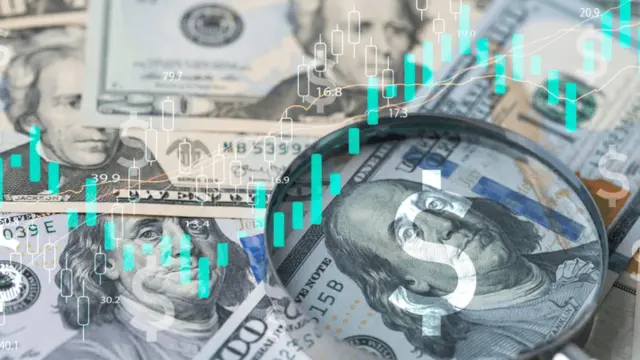trending
neon
Cirque du Soleil offers summer ticket deals
dining out
Celebs ditch the Strip for iconic Henderson restaurant
july 
trending
neon
Cirque du Soleil offers summer ticket deals
dining out
Celebs ditch the Strip for iconic Henderson restaurant
july 

The US Dollar’s fluctuations in value can have a significant impact on global trade and inflation. A stronger dollar can lower inflation by making imports cheaper, but it can also hurt US exports. Conversely, a weaker dollar can increase inflation but boost exports. This article explores these dynamics in the context of the global economy




The US Dollar (USD) is one of the most influential currencies in the world, serving as the benchmark for international trade, investments, and global finance. As the global economy continues to evolve, the strength or weakness of the dollar can significantly affect various economic factors such as global trade, inflation, and commodity prices. This article examines the impact of a strong dollar versus a weak dollar on global trade and inflation, with an emphasis on its consequences for businesses, governments, and investors.
Before delving into the economic implications, it's important to understand what is meant by a "strong" versus a "weak" dollar.
A strong dollar refers to a scenario where the value of the US Dollar increases relative to other currencies. For example, if the dollar strengthens against the euro or the yen, US goods and services become more expensive for foreign buyers, but imported goods become cheaper for Americans.
A weak dollar occurs when the value of the US Dollar decreases relative to other currencies. This makes US exports cheaper and more attractive to foreign buyers, but it can also make imports more expensive for US consumers and businesses.
The strength or weakness of the dollar is largely driven by factors such as interest rates, inflation expectations, economic growth, and the Federal Reserve’s monetary policy. Fluctuations in the value of the dollar can create ripple effects across the global economy, impacting both developed and emerging markets.
When the US Dollar is strong, its purchasing power increases on the global stage. This has several effects on international trade:
Higher Costs for US Exports: A stronger dollar makes US goods and services more expensive for foreign buyers. This can reduce the demand for US exports, which may hurt American manufacturers, agriculture, and service sectors. For example, US-made goods like electronics, cars, and machinery become less competitively priced in international markets.
Cheaper Imports for US Consumers: On the flip side, a stronger dollar makes imports cheaper for American consumers and businesses. This can benefit consumers as they can purchase foreign-made products at lower prices. However, it can also put pressure on domestic industries that compete with imported goods, leading to job losses in some sectors.
Shift in Global Investment Flows: A strong dollar often signals a robust US economy, attracting foreign investment. International investors may buy US assets such as stocks, bonds, and real estate, seeking to take advantage of the dollar’s strength. However, a stronger dollar can also lead to capital outflows from emerging markets, as investments in these markets become more expensive and less attractive.
The strength of the dollar can have a deflationary or inflationary impact, depending on various factors:
Lower Inflation via Cheaper Imports: A strong dollar generally has a disinflationary effect in the US. Because imports become cheaper, the cost of goods and services that rely on imported materials or components, such as electronics, clothing, and fuel, can decrease. This helps keep consumer prices low and controls inflation.
Reduced Inflationary Pressures for the Fed: With lower import costs, the Federal Reserve may have less pressure to raise interest rates, as inflation remains manageable. This can allow the central bank to maintain a loose monetary policy, supporting economic growth.
Pressure on Emerging Market Economies: While the US may benefit from a stronger dollar, many emerging market economies face challenges. These economies often carry debt denominated in US Dollars. When the dollar strengthens, repaying these debts becomes more costly, potentially triggering financial instability. This can contribute to inflationary pressures in emerging markets, as the cost of imports increases, and governments may be forced to raise interest rates to stabilize their currencies.
In contrast, when the US Dollar weakens, its purchasing power declines on the global stage, which also affects trade dynamics:
Cheaper US Exports: A weak dollar can make US-made goods and services more affordable for foreign buyers. This can lead to a surge in demand for American products, benefiting US exporters, particularly those in industries like technology, aerospace, agriculture, and consumer goods. American companies often report higher profits as their goods become more attractive internationally due to lower prices.
More Expensive Imports for US Consumers: A weaker dollar raises the cost of imports, making foreign goods and services more expensive for American consumers and businesses. For example, products like imported cars, electronics, and oil become pricier. This can contribute to higher costs of living and production costs in the US.
Potential Supply Chain Disruptions: The cost of raw materials and finished goods imported from other countries rises with a weak dollar, potentially leading to supply chain disruptions. Companies may need to raise prices to maintain profitability, further driving inflation.
A weak dollar generally creates inflationary pressures both domestically and globally:
Increased Inflation in the US: As import prices rise due to a weak dollar, the cost of goods and services increases. This can lead to higher overall consumer price inflation (CPI) in the US. Items such as food, fuel, and imported consumer goods become more expensive, affecting the purchasing power of American consumers.
Higher Costs for Global Trade: A weak dollar can also lead to higher commodity prices, particularly for oil and metals, which are priced in USD. Since many countries trade commodities in dollars, the value of the USD directly affects global inflation. A weaker dollar means that the cost of oil, gold, and other raw materials rises for international buyers, contributing to global inflation.
Rising Interest Rates: To combat rising inflation, the Federal Reserve may consider increasing interest rates. This can increase borrowing costs for businesses and consumers, potentially slowing economic growth. However, higher interest rates could also lead to stronger demand for the dollar, helping to stabilize the currency.
For businesses and investors, understanding the implications of both a strong and weak US Dollar is crucial for making informed decisions:
Currency Hedging: Companies that engage in international trade often use currency hedging strategies to protect themselves from exchange rate volatility. For example, US companies that export goods may hedge against the risk of a strengthening dollar to avoid reduced demand for their products.
Investment Diversification: Investors may choose to diversify their portfolios by holding assets in foreign currencies or in regions less exposed to fluctuations in the USD. This can provide some protection against exchange rate risk and reduce the impact of dollar movements on investment returns.
Commodities and Inflation: As the value of the dollar fluctuates, so too do the prices of commodities such as oil, gold, and agricultural products. Investors may want to consider commodity investments as a hedge against inflation, especially in periods of a weak dollar
The US Dollar’s fluctuations in value can have a significant impact on global trade and inflation. A stronger dollar can lower inflation by making imports cheaper, but it can also hurt US exports. Conversely, a weaker dollar can increase inflation but boost exports. This article explores these dynamics in the context of the global economy
the latest

Gulf Markets Rise on U.S. Rate Cut Hopes Despite Trade Risks
Major Gulf stock markets ended higher, boosted by optimism over potential U.S. Federal Reserve rate cuts, although ongoing global trade tensions continue to weigh on investor sentiment.

Reeves Weighs Tax Increases & Spending Cuts in November Budget
UK Finance Minister Rachel Reeves is reportedly preparing to raise taxes and cut spending in the the upcoming November budget to address rising borrowing costs and shrink the fiscal deficit.

UK Plans Easier Visa Path to Attract Global Talent: Reeves
UK Finance Minister Rachel Reeves announced plans to ease visa rules to attract top global talent, following Trump’s U.S. visa restrictions.

UAE Urges Netanyahu to Support Trump Gaza Peace Plan
The UAE pressed Israeli Prime Minister Benjamin Netanyahu to support Donald Trump’s Gaza peace plan and warned against annexation of the West Bank.

UK Inflation Slows, Oil Price Rise Creates New BoE Challenge
UK inflation eased slightly, but a sudden oil price surge has raised new concerns for the Bank of England as it balances growth, rates, and stability.

UAE Rate Cut Boosts Dubai and Abu Dhabi Stock Markets
Dubai and Abu Dhabi shares rose after the UAE central bank cut interest rates, boosting investor sentiment and signaling support for economic growth.

Meedaf Partners with InDebted to Expand UAE Operations
Fintech company Meedaf has partnered with InDebted to facilitate its expansion into the UAE, leveraging advanced debt collection and customer engagement solutions to strengthen regional operations.

Banker & Ex-Gov. Plead Guilty in Bancrédito Bribery Case
Former Puerto Rico Governor Wanda Vázquez and banker Julio Herrera Velutini have pleaded guilty to campaign finance violations linked to the Bancrédito scandal.

Visa Launches Visa Private in UAE for High-Net-Worth Clients
Visa has launched Visa Private in the UAE, a premium service designed for high-net-worth clients, offering tailored financial solutions, exclusive benefits, and concierge services.